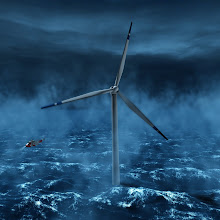
(Thanks to IGetNoSleep, who brought this topic up in the previous post's comments.)
If you have been watching the automobile industry, you have probably heard of Plug-in Hybrid Electric Vehicles, or PHEV's. These technologically advanced cars basically carry a gasoline engine and a battery to store a large electric charge. Because of the battery, according to the California Cars Initiative, drivers who commute for relatively short distances with these cars would rarely need to purchase additional gasoline, instead using a regular power outlet to recharge the battery. Understandably, this technological concept is very appealing, not only because of the low cost of electricity, but also because of the promise of independence from oil and gasoline. PHEV's may seem to promote renewable energy, but PHEV's still use a non-renewable energy source - power plants driven by fossil fuels. In fact, in an article on USA Today, the increased use of electricity may increase soot, mercury, and sulfur dioxide emissions. One car, though, can be powered by more than just electricity and gasoline, and is the PHEV I have heard the most about - the Chevrolet Volt(pictured above). Not only does the Volt run on electricity and gasoline, but it can also be powered by ethanol and solar energy via an optional photovoltaic cell accessory. Many PHEV's may not be powered by these renewable energy sources, but PHEV's do eliminate the need for direct fossil fuel use. If renewable energy manages to become the dominate electricity provider, then PHEV's would definitely reduce pollution. However, for now, PHEV's are merely the first step of a staircase that society must climb to access renewable energy.


6 comments:
Thomas,
I like how you took my questions that I had and turned them into a blog so that I can further understand where the United States stands with the weaning of fossil fuels. I see that these PHV's are actually lessening the immediate dependence of oil from gas. Now i realize that this is actually a major stepping stone as compared to my recent view that electric vehicles did nothing to help the environment. The only setback I see is that they still have to be plugged in. Yet you explain the other options like solar power that people can choose to become less and less dependent. As you say in your last sentence, these types of vehicles are the stepping stones or the "first step of a staircase" towards a completely autonomous society from fossil fuel.
Awesome!!,
Robert Lapp
IGetNoSleep,
I'm glad to see that you like my post. PHEV's would likely lessen America's dependence on oil, but PHEV's would still utilize gasoline for longer trips. Technological advancements can extend the current range a PHEV can travel without using gas, and the current battery is the only piece of equipment that allows solar energy to power a PHEV, as current technology, again, limits the effectiveness of solar power. Without the battery, solar energy would never be able to drive an engine. The battery in a PHEV, therefore, has opened the door for renewable energy to fuel America's cars, instead of a dependence on gasoline. Also, if you are interested in the stances of Barack Obama and John McCain, their websites both describe a support of PHEV's. You can find the links at the bottom of my main blog page.
Tommy
I really think it is interesting how there are so many advances in alternate fuel automobiles. I have some random questions about them. I have heard that these inventions have been around for a few years but the coal/ gasoline industry has had car companies suppress them. Is this true or did the advance electronics of the cars have to be tested more rigorously? Do you think that these cars will be on the market in the next few years and if so how much would you guess they would cost if gas prices still rise? These are just some questions on issues that I became aware of when I bought my Prius. I think the Prius is the only car right now that you can drive off the lot and the price improve. I have a feeling that the same trend will follow with this car and that supply and demand will result in high prices.
Grace Kelly,
PHEV's already exist, but most of those existing cars are modified, and not directly manufactured PHEV's. I do not know if the oil industry has suppressed these inventions, but the coal industry has many temporary gains to exploit with PHEV's. The Chevrolet Volt, according to my source, will be available in 2008, and will probably cost the same as other cars. The demand for PHEV's will likely be high, but I do not see how this would increase a PHEV's price.
Tommy
Although this is not the absolute ideal car, it is a step from pure gasoline. As with anything else, to ween ourselves off of oil is a slow process, but it is nice to see that progress is being made with these PHEV's and electric vehicles. The problem is that these new technologies are incredibly expensive, and until they are mass produced thus resulting in lowering the cost to buy the cars, people will be on oil and gasoline.
The Brown Man,
PHEV's are not ideal now, but could be if renewable energy manages to dominate the production of electricity. Indeed, the transfer to renewable energy will be slow, but America is definitely making progress. PHEV's, however, will not be very expensive, and their prices will probably be comparable to many other cars' prices.
Correction: Grace Kelly, the Volt will be available in 2010. Sorry for the misspelling.
Post a Comment